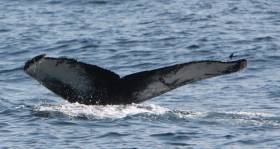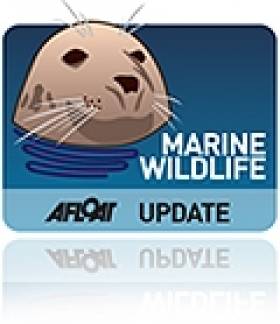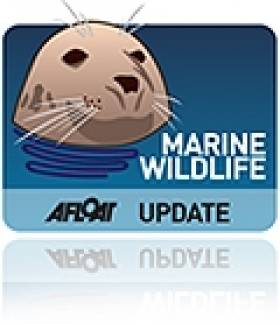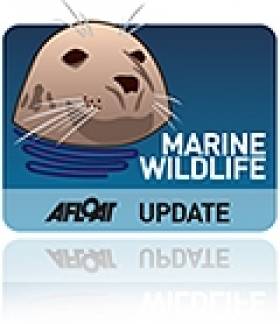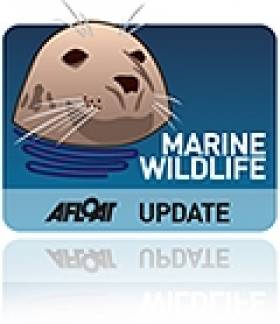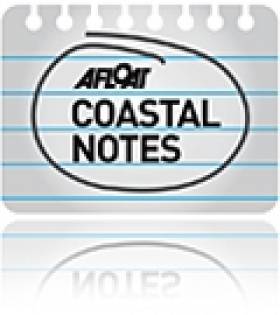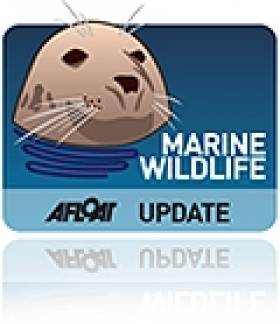Displaying items by tag: whale watching
IWDG Hosting Free, Guided Land-Based Whale Watches This Saturday for Biodiversity Week
The Irish Whale and Dolphin Group (IWDG) is running a series of land-based, guided whale watches in five counties around the island of Ireland this Saturday 21 May.
Hosted in celebration of Biodiversity Week and to promote the biological recording of marine wildlife like cetaceans and basking sharks in Irish waters, these free events will be led by experienced IWDG personnel and local members who will be on hand to introduce you to the field skills involved in locating, identifying and recording the more frequently seen whale and dolphin species in Irish waters.
No pre-bookings necessary so you can just turn up on the morning with your optics, sense of adventure — and sense of humour!
Whale watches are taking place this Saturday morning in the following locations:
- Loop Head, Co. Clare, meeting at Lighthouse, leader Mags Daly, tel 083 8401102, email: [email protected]
- Dun na mBó, Mullett Peninsula, Co Mayo, leader Sean Pierce, tel 086 8368736, email: [email protected]
- Rathlin Island, Co Antrim, meeting at West Lighthouse, leader Pádraig Whooley, tel 086 3850568, email: [email protected]
- Howth Head, Co Dublin, meeting at Balscadden Car Park, little shop (Howth Hub), leader Dave O’Connor, tel 087 6665049, email: [email protected]
- Cloghna Head, West Cork, meeting at Galley Head View car park, leader Denis O’Regan, tel 083 3369775, email: [email protected]
All five whale watches will take place from 10am to noon so you should arrive at your local meeting point in good time (9.50am) to ensure you don’t miss the welcome, introduction and safety briefing.
As whale watching requires reasonable weather, watch leaders reserve the right to cancel a local watch in the event of strong winds and/or rain, so our advice as always is to keep a close eye on the local weather forecast. If in any doubt, contact your local watch leader the day before your event (details below) to avoid a wasted journey.
You should dress appropriately for conditions on the day. The IWDG suggests warm and waterproof clothing and sturdy footwear if the forecast is marginal. If the weather is settled, then of course you should apply sunblock and wear a sun hat.
Also please remember to take away your rubbish, as these sites are both scenic and rich in biodiversity. It’s best to leave family pets at home.
Optics are important for land-based whale watching and at a minimum you should bring a pair of binoculars with which you’re familiar, and better again if you have a wildlife spotting scope. A camera with zoom lens is an optional extra, in case animals venture close to the shore.
Watch leaders will have some educational material to hand out and some will have whale artefacts of interest to show participants on the day.
There will be some IWDG resources and field guides for sale for anyone who’d like to support our charities work and learn more about our recording schemes.
#OnTV - Be sure to tune in to RTÉ One’s Nationwide tomorrow evening (Monday 30 July) for a special feature on whale watching and the Irish Whale and Dolphin Group’s (IWDG) conservation and research work.
RTÉ filmed with IWDG sightings officer Pádraig Whooley in October 2017 and more recently in mid May of this year, when presenter Anne Cassin and the Nationwide team travelled to West Cork for a day out with Cork Whale Watch.
It proved to be the perfect day for whale watching as the team filmed as many as 30 minke whales, more than 100 common dolphins, and the humpback whale known as HBIRL82.
See the results from 7pm on Monday 30 July on RTÉ One and later on the RTÉ Player.
New Season of Summer Whale Watching Courses on Cape Clear
#MARINE WILDLIFE - The Irish Whale and Dolphin Group (IWDG) has announced another series of its popular whale watching courses on Cape Clear in West Cork this summer.
The courses cater for adults keen to learn more about whales and dolphins in Irish waters and how to observe, record and identify them. They will feature a mixture of workshops and field trips, including cliff and boat-based whale watches.
Three weekend courses will take place on 25-27 May, 20-22 July and 7-9 September, led by IWDG sightings co-ordinator Pádraig Whooley. All are open to IWDG members and non-members alike, but places are limited to 20 places each weekend on a first-come-first-served basis.
Admission is €70 for IWDG members (€90 for non-members), with a non-refundable deposit of €25 required. Please note that this fee does not cover transport to Cape Clear, food or accomodation (which is limited in high summer) or any boat trips. As the itinerary will be weather-dependant, some flexibility will be required.
More information on the weekends and booking details are available at the IWDG website HERE.
In other IWDG news, the group has secured another grant from the Island Foundation to continue its humpback whale research in Cape Verde this spring and summer.
A shore-based team will be stationed in Boa Vista in an area that is "possibly the most important site for breeding humbacks in the entire northeast Atlantic".
Fin Whales Could Be Wexford Bound
#MARINE WILDLIFE - The Enniscorthy Guardian reports that the fin whales that have been sighted off Tramore in recent weeks may soon make their way towards the Wexford coast.
Afloat.ie recently reported that Waterford was the 'best place to be' for whale watching, with the Irish Whale and Dolphin Group (IWDG) confirming fin whale sightings along a 20-mile stretch from Stradbally to Brownstone Head.
Cetacean fans are being advised to keep an eye on the coast from Hook Head to Brownstown headland to catch a glimpse of the fins, which are renowned for their six-foot whale blow.
Whale watchers are also urged to report any sightings to the IWDG online at www.iwdg.ie to help keep its database up to date.
Places Available on IWDG Whale Watch Weekends
The Irish Whale and Dolphin Group (IWDG) is offering a limited number of places to non-members on its two upcoming autumn/winter whale-watching weekends in Co Cork.
The weekends, based at the Celtic Ross Hotel in Rosscarbery, are geared towards sightings of larger marine wildlife – specifically fin and humpback whales, which are commonly sighted in West Cork between October and December.
Two weekends are scheduled, on 28-30 Octover and 25-27 November, and both will include presentations as well as plenty of whale-watching opportunities on land and at sea.
The IWDG has also negotiated a special weekend rate of €120 at the Celtic Ross Hotel which includes two nights' B&B, an evening meal and a packed lunch.
The weekends are being booked in succession, both limited to 12 bookings, with seven places currently remaining for the first weekend. The IWDG warns that the trips are not suited to anyone in poor health or prone to sea-sickness, and that as always whale spottings cannot be guaranteed.
Anyone interested in attending or wishing to enquire further can contact Pádraig Whooley at [email protected] or 023 8838761, or write to the IWDG, Dereen, Rossmore, Clonakilty, Co Cork.
All-Ireland Whale Watch Day Next Weekend
All are invited to take part in the All-Ireland Whale Watch Day next Sunday 21 August.
The Irish Whale and Dolphin Group (IWDG) is organising 13 land-based whale watches from headlands around the Irish coast on the day from 2pm-5pm as part of the Heritage Council's annual Heritage Week.
Each will be led by experienced IWDG personnel, who will show you how to observe and identify some of the more commonly observed large marine wildlife seen in Irish waters.
The watches are free to attend - all that is required is to bring binoculars or a spotting scope, and dress appropriately for outdoor conditions.
The purpose of day is to raise awareness of the 24 species of cetaceans (porpoises, dolphins and whales) that can be seen around the Irish coast. The event will also provide IWDG researchers with a unique snapshot of whale and dolphin activity in Irish waters.
For details on your nearest whale watch visit the IWDG Whale Watch Ireland website.
A Day in the Life of a West Cork Whale Watcher
Today's Irish Times recounts a day in the life of whale watch operator Nic Slocum.
Originally from the UK, Slocum traded tiring commutes to London for the peaceful life of sailing in west Cork 10 years ago, and shortly after turned his hobby into a new business by running whale watching excursions.
"We don’t promise whales and dolphins every time because they are unpredictable creatures," says the Whale Watch West Cork proprietor, "but for anyone interested in wildlife, there is an abundance of things to see. The marine coast is spectacularly beautiful here."
The Irish Times has more on the story HERE.
Summer Whale Watching Courses on Cape Clear
The Irish Whale and Dolphin Group (IWDG) is running a new series of its popular whale watching courses on Cape Clear in Co Cork this summer.
The first weekend course from 8-10 July 2011 caters for adults keen to learn more about whales and dolphins in Irish waters and how to observe, record and identify them. It will feature a mixture of workshops and field trips, including cliff and boat-based whale watches.
Admission for this course is €70 for IWDG members (€90 for non-members). Please note that this fee does not cover transport to Cape Clear, food or accomodation, or any boat trips. As the itinerary will be weather-dependant, some flexibility will be required.
Places are also limited to 20 per course on a first-come-first-served basis. Booking requires a non-refundable deposits of €25 to be paid by cheque or postal order to the IWDG.
For bookings and enquiries contact IWDG sighting co-ordinator Pádraig Whooley at [email protected] or 023 883 8761.


























